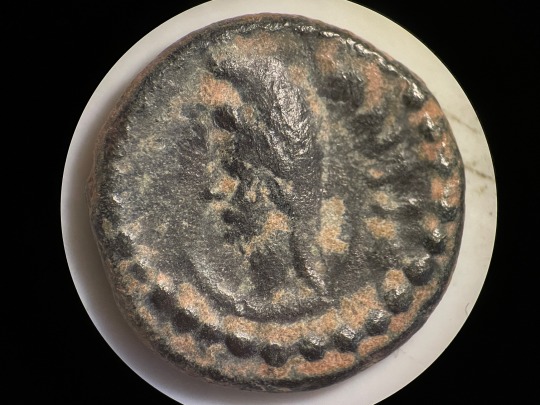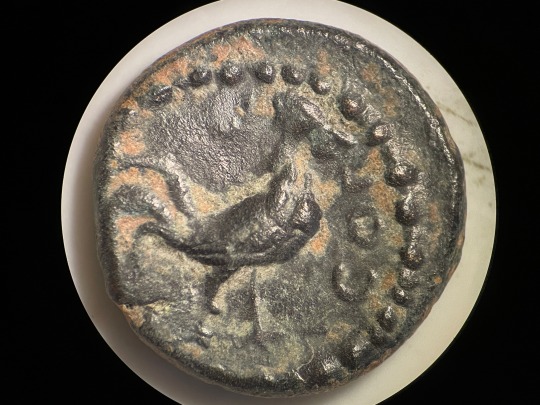#Antio
Explore tagged Tumblr posts
Text
youtube
Zeus and His 22 Divine Romantic Conquests
#Pandora#Neoi#Aena#Aara#Antio#Thalia#Maya#Electra#Semile#Alain#Donai#Kalisto#Europa#IO#Minimos#Leato#Deer#Dion#UrEnemy#Theus#Midus#Hera#ZeusConquest#QueenOfGods#youtube#mythology#videos#Youtube
0 notes
Text

Sam's blueberry pie 🫐🥧 Which he's, as per the running joke on this blog, just as normal as U◠꓃ ◕ U
#been trying to paint on this new tablet my brother got me and my heart immediately gravitated to food jaja#digital art is still so new to me and it's been fun trying to work it out!! my main respite is being able to work with colors comfortably :]#in traditional art it's really exhausting to color besides the splashes of color I like to do so I just. don't do it anymore#exciting things!! now I'm a bonafide traditional And digital artist. feels funky#anyway I've also been linking music in all my recent posts - which I'm gonna keep doing bc it's nice to brag about my music taste a little#NO idea if anyone actually clicks on them/listens to them but it's nice anyway :] I link the most relevant song to the piece#whether it's what I was mostly listening to while drawing/writing or the driving inspiration for the piece itself. fun fact if anyone cares#for this one I listened to (because I always tag the song name/artist):#delegation oh honey#and also red dead music/gameplay. funny considering huh#ANYWAY I'M DONE YAPPING. I had a lot to say today for some reason. ciao adios khodahafez antio au revior tschüss etc etc#digital art#morelikesin#my art#don't steal#original#finished#food
6 notes
·
View notes
Text
I THOUGHT HER NAME WAS HATUME😭😭😭😭
6 notes
·
View notes
Text
and im not doing any of these projects either i dont care i dont caaaaarreeee
3 notes
·
View notes
Text
fotografo ceco (1893-1940)

Anton Josef Trčka (Antios) • Untitled, 1926
284 notes
·
View notes
Text
Review: Three Revolutionary Films by Ousmane Sembène on Criterion Blu-ray
Together, these films constitute a complex, interlocking portrait of Senegal’s past and present.
by Derek Smith May 30, 2024

Where Ousmane Sembène’s first two films, 1966’s Black Girl and 1968’s Mandabi, each focus on myriad struggles faced by an individual during Senegal’s early post-colonial years, his follow-up, Emitai, takes a more expansive view of the effects of colonialism two decades earlier. Centering on the defiance of a Diola tribe during World War II, 1971’s Emitai sacrifices none of the immediacy and urgency of Black Girl and Mandabi. Indeed, the film is perhaps an even more damning and incisive take-down of French colonial rule.
Painting a concise and pointed portrait of oppression in broad, revolutionary strokes, Emitai exposes the modern form of slavery that was France’s conscription of Senegalese men to fight on the deadliest frontlines of European battlegrounds. The film simultaneously details the meticulous taxation methods the French employed during this period, which, in attempting to seize a majority of tribes’ rice supply to feed their troops, is tantamount to starvation warfare.
Sembène, however, is less interested in the methodologies of the oppressor than in the unwavering, often silent protest of the Diola people, especially women, in the face of forces that threaten to wipe out the rituals and traditions that define them. In depicting the tribe’s refusal to turn over their rice not as a means to avoid starvation but as a matter of preserving the central value rice has in their cultural heritage, Sembène adds new dimensions to the conflict and complexity to the resistance of the villagers. The inevitable tragedy that concludes the film is quite the gut-punch, but in counterbalancing it with the rebellious enacting of funereal rites by the village women, Emitai becomes equal parts an indictment of colonial violence and a celebration of resilience and self-empowerment through revolutionary means.
In 1975’s Xala, Sembène presents a searing, often hilarious satire of the greed, corruption, and impotence of the new Senegalese governmental leadership following the eradication of French colonial rule. In the opening scene, we see government officials throw out the current French leaders and proudly proclaim that Africa will take back what’s theirs. This moment of triumph, which includes the removal of statues and busts of various French leaders, is swiftly undercut when the Senegalese officials each open a briefcase packed to the brim with 500 Franc bills.
This sequence, laden with anger and biting humor, is indicative of Xala’s absurdist, comedic tone. And as the film shifts its focus to one corrupt official in particular, El Hadji (Thierno Leye), who upon marrying his third wife is cursed with impotence, its satire becomes more metaphorical than direct. Sembène uses El Hadji’s gradual downfall to reflect the moral and political failings of the entire bourgeois class that came into power under the government of President Léopold Sédar Senghor. Through Sembène’s sly, cutting use of irony, claims of modernity and equality under a new “revolutionary socialism” are revealed to be empty promises, barely concealing the anti-feminist and pro-capitalist motives lurking behind them.
Sembène’s critique of a supposedly freed Senegal is intensely savage when it comes to unveiling the hypocrisies of a patriarchal leadership that betrayed the trust of the people it was supposed to aid and protect. Building to a conclusion that’s as funny and gratifying as it is pitiful and physically revolting, Xala captures the continuing repercussions of colonialism and how the forced delusions of a nation would leave its people perversely feeding on one another.
With 1977’s Ceddo, set in Senegal’s distant pre-colonial past, Sembène follows the conflicts between a growing Islamist faction of a once animistic tribe and the Ceddo, or outsiders, who refuse to convert and give up their animistic rituals and beliefs. This is certainly the most didactic entry in this set, but it’s enlivened by the sheer precision of its dialectical oppositions, through which the many hypocrisies of religious fundamentalism and colonization are laid bare.
Ceddo also reveals the complex intersectionality of religions and cultures that were at play in Senegal long before its colonization. Along with the Muslims, who were attempting to seize political power through religious conversions, white Christians and Catholics are present in the form of priests, missionaries, gun runners, and slave traders. The latter are silent through much of the film, but their presence—much like the white French adviser who remains in constant contact with the Senegalese politicians in Xala—speaks to the monumental power and influence whites held in Senegal even before colonialist rulers took over.
While the film’s subject is historical, Sembène draws clear parallels between the past and the post-colonial present of 1977, with the condescending paternalism of the Muslims, particularly the power-hungry imam played by Alioune Fall, mirroring that of the colonialist French. And rather than using traditional Senegalese music, Sembène employed Cameroonian musician Manu Dibango to compose a jazz-funk score that even further connects the events in Ceddo to the time of its release in the late ’70s. For whenever Sembène sets his film, he’s steadfast in his mission to draw meaningful correlations between Senegal’s past and present—each equally integral to the story of the country he loved and helped to define.
Image/Sound
All three transfers come from new 4K digital restorations and they, by and large, look terrific, with vibrant colors and rich details, especially in the costumes and extreme close-ups of faces. There are some shots where the grain is chunkier and the image isn’t quite as sharp, and the Ceddo transfer shows some noticeable signs of damage in several different scenes, but these are mostly minor, non-distracting imperfections. The mono audio track bears the limitations of the production conditions, so some of the dialogue in interior scenes is a bit echoey though still fairly clear. Meanwhile, the music comes through with a surprising robustness.
Extras
A new conversation between Mahen Bonetti, founder and executive director of the African Film Festival, and writer Amy Sall covers a lot of ground in 40 minutes. The two discuss Ousmane Sembène’s early career and discovery in the West before delving into his use of cinema as “a liberatory force” and his sly, caustic use of irony. The only other extra on the disc is a 1981 short documentary by Paulin Soumanou Vieyra in which Sembène espouses much of his philosophy of filmmaking, particularly the importance of understanding history and political complexities of the society one chooses to depict. (Amusingly, Sembène’s wife casually insults American moviegoers, as well as complains about her husband putting film before family.) The stunningly designed package also comes with a 26-page bound booklet containing an essay by film scholar Yasmina Rice, who touches on Sembène’s humor, feminism, and politically charged subjects, while forcefully pushing back against the notion that the director wasn’t much of a formalist.
Overall
These Ousmane Sembène films from 1970s brim with a revolutionary passion and, together, constitute a complex, interlocking portrait of Senegal’s past and present.
Score
⭐️⭐️⭐️⭐️⭐️
Cast
Andongo Diabon, Michel Renaudeau, Robert Fontaine, Ousmane Camara, Ibou Camara, Abdoulaye Diallo, Alphonse Diatta, Pierre Blanchard, Cherif Tamba, Fode Cambay, Etienne Mané, Joseph Diatta, Dji Niassebaron , Antio Bassene, M’Bissine Thérèse Diop, Thierno Leye, Seune Samb, Younouss Seye, Miriam Niang, Fatim Diagne, Dieynaba Niang, Makhourédia Guèye, Tabara Ndiaye, Alioune Fall, Moustapha Yade, Mamadou N’Diaye Diagne, Nar Sene, Mamadou Dioum, Oumar Gueye.
#Andongo Diabon#Michel Renaudeau#Robert Fontaine#Ousmane Camara#Ibou Camara#Abdoulaye Diallo#Alphonse Diatta#Pierre Blanchard#Cherif Tamba#Fode Cambay#Etienne Mané#Joseph Diatta#Dji Niassebaron#Antio Bassene#M’Bissine Thérèse Diop#Thierno Leye#Seune Samb#Younouss Seye#Miriam Niang#Fatim Diagne#Dieynaba Niang#Makhourédia Guèye#Tabara Ndiaye#Alioune Fall#Moustapha Yade#Mamadou N’Diaye Diagne#Nar Sene#Mamadou Dioum#Oumar Gueye#The Criterion Collection
1 note
·
View note
Text
Unleashing the Power of CocoAmrit Coconut Water: Reap the Amazing Benefits!
CocoAmrit coconut water has emerged as a popular choice among health-conscious individuals, offering a range of benefits that go beyond mere refreshment. Packed with natural goodness, CocoAmrit provides a delightful way to hydrate your body and indulge in the myriad advantages offered by this tropical elixir. Join us as we dive into the extraordinary benefits of CocoAmrit coconut water and explore why it has become a go-to beverage for health enthusiasts everywhere.
Section 1: Hydration and Refreshment When it comes to quenching your thirst, nothing compares to the pure and revitalizing properties of CocoAmrit coconut water. Its natural electrolyte composition, including potassium, sodium, magnesium, and calcium, replenishes fluids lost during physical activities or hot weather. With CocoAmrit, you can keep dehydration at bay while delighting in a crisp, delicious beverage.
Section 2: Electrolyte Replenishment Electrolytes play a crucial role in maintaining the body's balance and aiding various bodily functions. CocoAmrit coconut water is a fantastic source of electrolytes, making it an excellent choice for athletes, fitness enthusiasts, and those in need of rehydration. By restoring these essential minerals, CocoAmrit supports optimal performance and helps prevent muscle cramps and fatigue.
Section 3: Antioxidant Boost CocoAmrit coconut water is packed with antioxidants that help combat oxidative stress and protect your body from free radicals. These antioxidants, such as vitamin C and other phytochemicals, bolster your immune system and promote overall well-being. By regularly consuming CocoAmrit, you can give your body the extra support it needs to stay healthy and ward off illness.
Section 4: Natural Energy Source Looking for a natural and sustainable source of energy? Look no further than CocoAmrit coconut water. Instead of reaching for sugary energy drinks or caffeine-packed beverages, CocoAmrit offers a healthier alternative. The naturally occurring sugars in CocoAmrit provide a gentle boost, keeping you energized without the crash often associated with artificial stimulants.
Section 5: Low-Calorie Delight For those mindful of their calorie intake, CocoAmrit coconut water presents a guilt-free option. With its low-calorie content, CocoAmrit allows you to enjoy a delicious beverage without worrying about excessive sugar or unwanted weight gain. It's a fantastic choice for anyone striving to maintain a balanced and healthy lifestyle.
Conclusion: CocoAmrit coconut water has rightfully earned its place as a beloved health drink, offering a multitude of benefits that range from hydration and electrolyte replenishment to antioxidant support and natural energy. By incorporating CocoAmrit into your daily routine, you can not only enjoy a refreshing and delicious beverage but also reap the rewards of its numerous health advantages. Join the CocoAmrit movement today and unlock the true power of coconuts for your well-being.

0 notes
Text

w (300-/e) wnoc antio --- (293847588.093c) e-
#chief keef#Sosa#glo gang#glory boyz#glory boy#chief keef sosa#explore#aesthetic#archive#inspo#photography#music#hip hop#rap#trap#rapper#rap aesthetic#hip hop aesthetic#lil durk#fredo santana#kodak black#g herbo#gunna#nba youngboy#king von#young thug#polo g#ybn nahmir#playboi carti
34 notes
·
View notes
Photo

“Once more — the magic of the Greek islands and her people have captured my heart. Thank you all for your gracious welcome. Until next time…antio sas 🙏 photo by @keelyshayebrosnan” - piercebrosnanofficial
Just Pierce Brosnan being a lovely man as usual.
66 notes
·
View notes
Text
Coin of the Day #313 (3/13/2025)
A nice little bronze…


Roman Province - Pisidia
AE13 - 1.56g
Pseudo-Autonomous 138-161 AD
Antioch Mint
Obverse ANTIO
Head of Mên wearing Phrygian cap right, on crescent
Reverse COLO (retrograde)
Cock standing right
RPC IV 7353
#coin of the day#roman empire#roman province#ancient rome#antoninus pius#antioch#pisidia#roman coins#numismatics#coin#coins#ancient coins#mên
4 notes
·
View notes
Text



Batch of 3 commissions done :
- Obrian @Antios Kalkares - Vergil from DMC for Claudine Leroy - Julius @VanVermillyon
[Commissions are still open]
#artists on tumblr#french artist#traditionalartist#mangaart#fanart#commissionart#commissions#open commissions#not my oc#devil may cry#dmc5#dmc vergil#vergil#vergil fanart#clairefontainepaper#paintonnaturalpaper#up the baguette
23 notes
·
View notes
Text
language of HAIQIN | beliefs
------------------------------------------------------------------------------
date: february 17, 2025.
------------------------------------------------------------------------------
Words for Religion and beliefs in Haiqinian
Religion
༄𓂃 Goddess: Thea (𐌸𐍅𐌰)
༄𓂃 Deity: Theos (𐌸𐍅𐌴��)
༄𓂃 Divine: Theios (𐌸𐍅𐌴𐍄𐍃)
༄𓂃 Shrine: Hierón (𐌷𐍀𐍄𐍉𐌽)
༄𓂃 Temple: Naos (𐌽𐍉𐌰𐍃)
༄𓂃 Altar: Bōmos (𐌱𐍉𐌼𐍉𐌽)
༄𓂃 Priestess:
Hiereia (𐍄𐍉𐌴𐌴𐌹𐍂𐌰)
Hierophantēs (𐌷𐍀𐍅𐌹𐌹𐍊𐌰𐌽𐍄𐌴𐌽𐍂)
Hierophantis (𐌷𐍀𐍅𐌹𐌹𐍊𐌰𐌽𐍄𐌴𐌽𐍀𐌴𐍃)
༄𓂃 Ritual: Thysia (𐌸𐍅𐌹𐍃𐍄𐍄𐌰)
༄𓂃 Offering: Prosphora (𐍀𐍂𐌰𐌹𐌺𐍂𐍂𐌰)
༄𓂃 Sacred: Hieros (𐍄𐍀𐌴𐍃𐍃)
༄𓂃 Ceremony: Leitourgia (𐌻𐍅𐍄𐍉𐍅𐍇𐌹𐍀𐌲𐌲𐌹𐌰)
༄𓂃 Prayer: Proseuchē (𐍀𐍂𐍅𐍃𐌿𐌽𐌴)
༄𓂃 Pilgrimage: Hodoiporia (𐌷𐍅𐌳𐌿𐍂𐌻𐌹𐍀𐌰)
Spirituality
༄𓂃 Nature: Physis (𐍀𐍅𐌹𐌹𐍄𐍃)
༄𓂃 Soul: Psychē (𐍀𐌿𐌴𐍂𐍄𐌴)
༄𓂃 Spirit: Pneuma (𐍀𐍄𐌴𐌿𐌼𐌰)
༄𓂃 Harmony: Harmonia (𐍅𐍀𐍂𐌹𐌻𐍉𐌽𐌰)
༄𓂃 Balance: Isodynamia (𐍅𐍃𐌴𐍅𐍄𐍉𐌽𐍀𐍄𐌰)
༄𓂃 Unity: Henōsis (𐌷𐍉𐌽𐌿𐌹𐍃𐍃)
༄𓂃 Wisdom: Sophia (𐍃𐍅𐍀𐌰𐌷𐍉)
༄𓂃 Enlightenment: Photismos (𐍀𐍂𐍄𐌹𐍃𐍄𐍃𐍄𐍉𐌼)
༄𓂃 Meditation: Meditasia (𐌼𐍉𐌳𐍄𐌰𐌼𐍂𐍉𐌶𐍉)
༄𓂃 Connection: Syngeneia (𐍃𐍅𐍐𐌲𐌴𐍄𐌴𐌹𐍃𐍃)
༄𓂃 Cycles: Kykloi (𐌺𐍅𐍃𐌺𐍉𐌻𐍉𐍀)
༄𓂃 Divination: Mantis (𐌼𐍅𐌴𐌽𐍄𐌰𐍃)
༄𓂃 Guidance: Hodēgos (𐌷𐍅𐌳𐌴𐍀𐌰𐌲𐌿𐌲)
༄𓂃 Serenity: Eirēnē (𐍂𐌹𐍂𐍀𐍂𐌴𐌽𐍉)
༄𓂃 Blessing: Eulogia (𐍂𐌿𐌻𐍂𐌲𐍉𐌷𐌰)
༄𓂃 Cycle of Life: Kyklos Zoēs (𐌺𐍅𐍃𐌺𐍉𐌻𐍉𐍀 𐍆𐌿𐌴𐍃)
༄𓂃 Protector: Asfalistēs (𐍀𐍆𐍆𐍉𐌻𐌹𐌲𐍃𐌴𐌽𐍂)
༄𓂃 Guardian: Phylax (𐍀𐍅𐍄𐌰𐌻𐍃)
༄𓂃 Nature's Embrace: Physis Ennoia (𐍀𐌹𐍅𐍄𐌹𐍃𐍃 𐍇𐌍𐌽𐍅𐌹𐍃)
༄𓂃 Sacred Grove: Hieron Alsos (𐍁𐍉𐌺𐍅𐍂𐌽 𐌰𐌻𐍃𐍅𐌹𐌽𐍂)
Death
༄𓂃 Death: Thanatos
༄𓂃 Passing: Diapragmatefsi
༄𓂃 Demise: Telos
༄𓂃 Departure: Anachoresi
༄𓂃 Farewell: Antio
༄𓂃 Eternal Rest: Athanasia Ipochoma
༄𓂃 Soul's Release: Aphesis Psychis
༄𓂃 End: Telioni
༄𓂃 Cessation: Stasi
#reyaint#reality shifting#reality shifter#shiftblr#shifting#shifting community#shifting motivation#anti shifters dni#dr scrapbook#dr world
3 notes
·
View notes
Text



Drowning.
Trying.
Grieving.
-
Practicing my portraiture; albeit through unconventional means.
#me trying to share my taste in music again and the sky is blue no one is surprised nor seated#three portraits; three titles; they go down the line belonging to who you'd expect#also me trying to uh. hint hint at some deeper character traits for them all. wink. you know who you are mwah I hope you enjoy#and to that same person YES. yes August's picture is from the scene we're on now. I was inspired alright what can I say#ENOUGH YAP adios ciao adieu adeus salaam antio khodahafez etc et cetera#ocs#ophelia yildiz#august aigner#samuel al-abbasi#morelikesin#my art#don't steal#finished#digital art#original#really late tag but bc their music tastes can be pretty rigid the music might be a bit of a stretch as far as relating to the portaits go#I tried my best aight I could've added any songs I wanted but I want to stay true to these characters. I decided that choosing songs-#-they'd actually be into fit the bill here. I am explaining this to no one but I feel better clearing it up anyway it's a bad habit a mine#kindar murder king#so seductive kero one#st. james infirmary blues cab calloway
3 notes
·
View notes
Text
Umbrella term for being intersex and your gender isn't your AGAB?
So right now, we have an established term, ipsogender, for an intersex person whose gender is the same as their gender assigned at birth.
To my knowledge, there is not an umbrella term for an intersex person whose gender is not the same as their AGAB. Right now we have the established term, ultergender, for an intersex person whose gender isn't their AGAB and doesn't identify as trans, and the category of trans-intersex for those that do.
EDIT: I have been informed by @interarchive that ultergender was coined to be an opposite of ipsogender, and is not actually exclusive of trans people. So the umbrella term is actually ultergender! 💜
I am crossing off the rest of the text of this post to make clear the poll is no longer needed for this purpose. Ty <3
In the world of anatomy, the opposite of ipsi- (same) is contra- (against), which is what to me would be the obvious choice. Unfortunately, the term contragender is already taken. 😭
Here are some options I'm considering, and want feedback on. Sorry Tumblr only lets you vote for up one thing so let me know in the replies if you like multiple, dislike any, etc.
Countergender has a previous coining but from what I can tell it didn't take off? If people are using this way please let me know, right now. It also seems to have limited use in sociology as shorthand for counter-stereotypic gender things. 🤔
Let me know what you think of the options! I'd especially like to hear from ultergender people and trans-intersex people whose gender isn't their AGAB. 💛
#intersex#intersex terminlogy#ultergender#trans-intersex#countergender#mogai#mogai requests#mogai peer review#actuallyintersex#actually intersex
10 notes
·
View notes
Text
antio ormones xaras!! kalispera 17:00 disi 😍😍
5 notes
·
View notes
Note
Re: your prompt request post— cassaudy+snacking? whether it be "does audy do something that is emotionally equivalent to a human who eats having a comfort food snack" or maybe "cass misses apostolosian snacks" (imagine this bit crossed out, but I can't do that formatting in a tumblr ask: or someone correctly saying that cass and audy are both snacks in their own right). Or whatever else strikes your fancy about it!
In response to this post:
AuDy finds it difficult not to notice the look on Cass's face when they pass the Apostolosian grocery tucked away in an alley not far from the spaceport where the Kingdom Come is docked. The store is new, or at least AuDy doesn't recall it being there the last time they'd been down this street. Cass doesn't comment on it as they pass, though, so AuDy just files its existence away and moves on with their day.
They don't think about it again until a few weeks later, when they walk into the ship's galley to find Cass unloading several bags bearing the grocery's branding. Mako and Aria are standing off to the side, each of them holding snacks bearing Apostolosian script on the packaging.
"Don't you think you went a little overboard?" Mako, of all people, asks around a mouthful of highly processed cake-stuff.
"I don't know what you're talking about," Cass responds, balling up an empty bag and stuffing it into another bag.
"This has to be like half your paycheck," Aria says. She shakes a few kernels of something akin to popcorn into the palm of her hand and pops them into her mouth.
Cass bristles a little. "I don't tell you what to do with your royalties."
Aria holds up her hands in a placating gesture. "I'm not complaining! It's your money, do what you want with it."
"This thing is pretty good," Mako says. "What's it called again?"
"Those are Antio Psari Sea-plum Pies," Cass responds without looking up. "I used to eat them a lot when I was younger and I could bribe Sokrates to sneak them into the palace for me."
"Oh, you mean Mx. Fancy-Pants Scion ate the cakes of the common people?" Mako teases.
Cass finishes unloading another bag and sighs. "I know I'm part of the royal family, but that doesn't mean I'm completely out of touch."
"You are sometimes out of touch," AuDy says.
Cass groans. "Don't encourage him. You know what? Everyone out. No more Sea-plum Pies and Kelp Popt's until you can be nicer to me."
Mako laughs and tosses the wrapper for his Sea-plum Pie at Cass. It flutters uselessly to the floor half-way between them. "Alright grumpy gills. I can tell when I'm not wanted." He hops off the counter he'd been perched on and starts ushering Aria and AuDy out of the galley. "C'mon."
AuDy lets themself be shuffled out, but they take a few quick shots of the packages spread out next to Cass before they leave.
*
The primary drain on AuDy's paycheck is paying off the Kingdom Come, but that doesn't take up everything. AuDy's bank account (held in Orth's name) contains a tidy little sum they hold onto for a rainy day.
It's not a rainy day, but AuDy has noticed a distinct lack of Apostolosian junkfood in the galley in recent weeks. The last time they saw someone eating an Apostolosian snack was days ago, when Cass crammed what was likely a stale jelly snack of some sort in their mouth before a mission.
It's completely reasonable, then, for them to find themself at the small Apostolosian market in the alley near the spaceport. They enter the shop to the tinkling of bells, and an older Apostolosian hesitantly greets them from behind the counter after favoring AuDy with a baffled look. In the lingua franca, and with a moderate accent, they say, "Welcome! Is there anything I can help you with?"
"Sea-plum pies," AuDy states.
"Oh, they're over here," the employee says, stepping away from the counter and guiding AuDy down a narrow aisle to a shelf filled to bursting with Apostolosian sweets. AuDy does not hesitate to grab as many boxes as can fit in their arms. "I will take these."
The grocer chuckles nervously. "Alright. I'll ring you up."
The total is significantly smaller than what AuDy has in their bank account, so they don't feel any particular guilt for splurging on such a thing. With three bags of sea-plum pies in hand, they make their way back to their ship.
They make sure no one is in the galley before they go there to unload their haul, and they hide the bags so as to make it appear that they hadn't been shopping. The only evidence they leave of their errand is a single box of pies left out on the central counter, where it would be impossible to miss.
*
"Where'd these come from?" Cass asks from the entrance to the common area, holding a box of sea-plum pies.
"Dunno," says Mako without turning to look.
"Ooh! I love those!" Aria chirps as she sees what Cass is holding.
Cass's eyes land on AuDy, an expectant look on their face.
"I have no idea," AuDy lies. They're not sure what subroutine moves them to obfuscate the truth, but Cass seems to let it go.
"Well, whoever got them… thanks."
AuDy does not say, 'You're welcome.'
4 notes
·
View notes